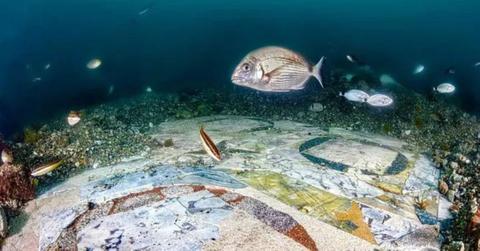Sunken Treasure: 'Stupendous' Underwater Marble Mosaic from Roman Empire Discovered in Italy

Campi Flegrei Archaeological Park officials said thousands of marble slabs with hundreds of different shapes were brought together to create a very articulated geometry.
A team of underwater archaeologists has unearthed a rare ancient mosaic off the coast of Naples, Italy.
The discovery was made in the Submerged Archaeological Park of Baia, a renowned site for underwater historical treasures.
The Campi Flegrei Archaeological Park shared on Facebook, "Thousands of marble slabs, hundreds of different shapes, [were] brought together to create a very articulated geometry."
The park, situated in the volcanic region of Campi Flegrei, is an area rich in historical significance.
The mosaic is believed to originate from a reception room of a villa constructed towards the end of the Roman Empire. The villa eventually sank beneath the sea due to volcanic activity known as "bradyseism," a phenomenon where the ground either rises or falls over time, FOX News reported.
According to the Campi Flegrei Archaeological Park's website, "There is the phenomenon of bradyseism, it consists of an elevation (positive bradyseism) or lowering of the ground level (negative bradyseism) relatively slow on the human time scale but very fast compared to geological times.”
- What Lies Beneath: NASA Scientist Believes Aliens May Have Found 'Perfect' Hiding Spot in Earth's Oceans
- Global Threat: Russia Insider Warns West of 'World War Using Nuclear Weapons' Amid Escalating Support for Ukraine
- Countdown to Disaster? Ex-NATO Official Warns Russia, Iran and China Could Wage WWIII in Just Years
Spanning over 250 square meters, the mosaic is composed of carefully arranged marble, including second-hand materials, forming refined squares with inscribed circles. The intricate design indicates the villa's owner invested heavily in its construction.
Josi Gerardo Della Ragione, the mayor of Bacoli, praised the discovery in a Facebook post, describing it as "stupendous."
Never miss a story — sign up for the Front Page Detectives newsletter. Be on the scene the moment news breaks.
He highlighted the mosaic as a remarkable find in the world's largest underwater archaeological park. The mayor also thanked the Campi Flegrei Archaeological Park for their efforts, noting that such discoveries will boost tourism in the region.
The excavation and restoration work is a collaborative effort between the CSR Restoration of Cultural Heritage and the Naumacos Underwater Archaeology and Technology. Researchers are now working to carefully extract the marble pieces from the ocean floor for further study and preservation.
Become a Front Page Detective
Sign up to receive breaking
Front Page Detectives
news and exclusive investigations.
